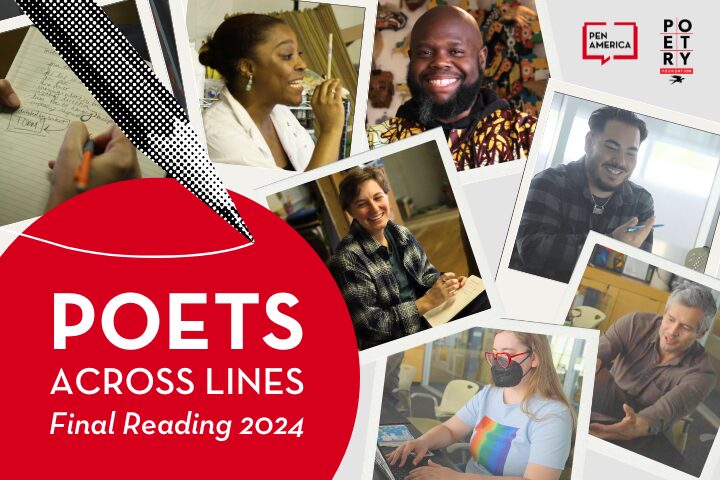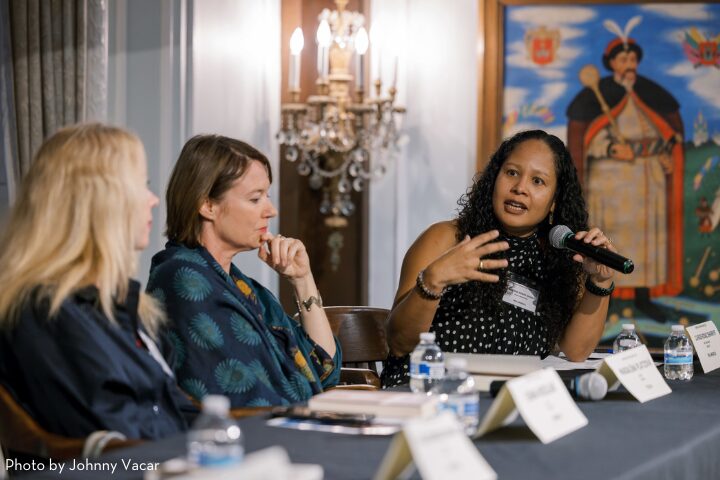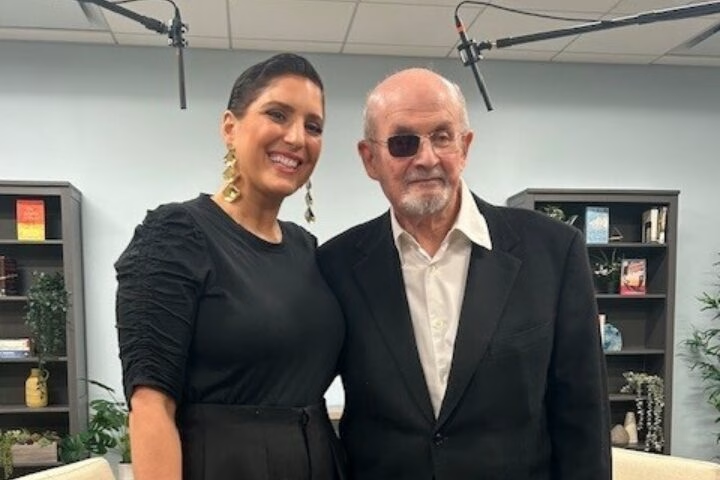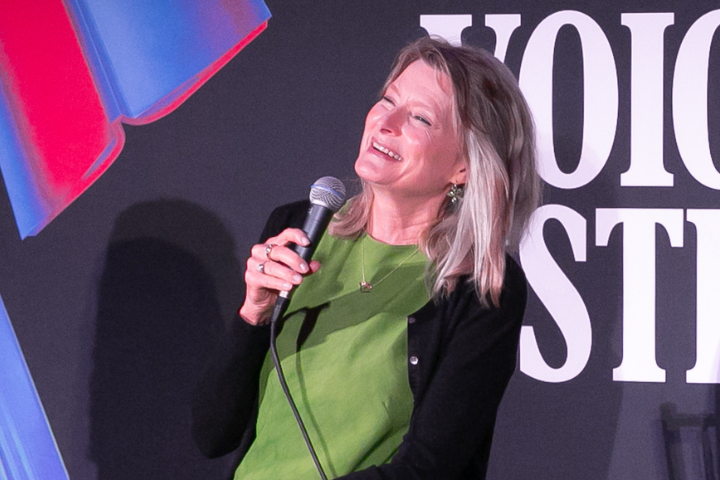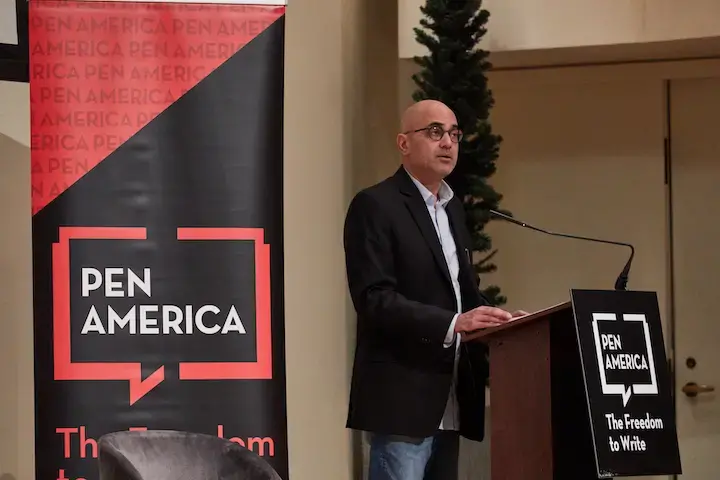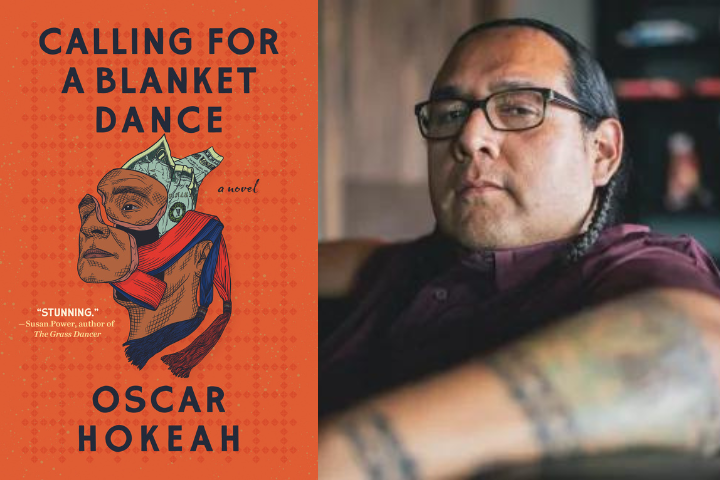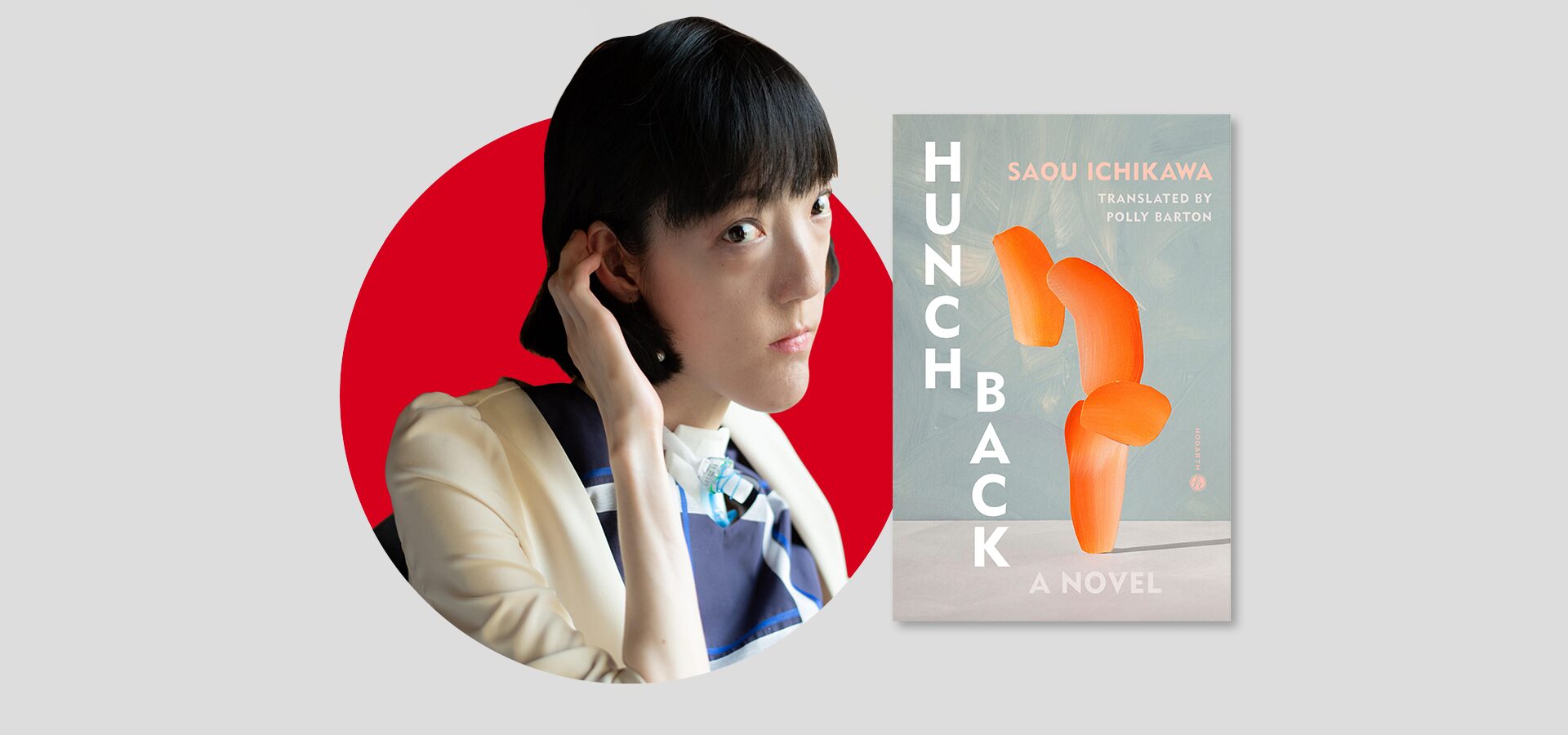
Saou Ichikawa | The PEN Ten
In 2023, Saou Ichikawa’s novel Hanchibakku captivated Japanese audiences and won the prestigious Akutagawa Prize. Now available in English thanks to Polly Barton’s brilliant translation, Hunchback (Hogarth, 2025 – translated by Polly Barton), is longlisted for the International Booker Prize. In the novel, Ichikawa’s narrator, Shaka, paints a poignant picture of sex, disability, justice, and escapism with a defiant (and, at times hilarious) voice as she posts erotic fantasies on swinger’s websites and strikes an illicit deal with one of her caregivers.
In this interview with Claire Mehrotra, literary programs consultant for PEN America, translated by Polly Barton, Ichikawa explores the need for disabled voices in literature, the obligations of governments, and the immutable importance of humor and sexuality.
『ハンチバック』の語り手である釈華は、自分が暮らす介護施設からの逃避として、性的な欲望を満たしたい人たち(スインガー)向けのウェブサイトにエロティックなフィクションを書いています。小説は、そうしたフィクションのひとつから始まり、釈華の人生の現実が明らかになります。小説をこのように書き始めたのは、どのような意図があったのでしょうか?
The narrator of Hunchback, Shaka, writes erotic fiction for swinger’s websites as a form of escapism from the care home in which she lives. The novel opens with one of those fictions before revealing the reality of Shaka’s life. What did you hope to accomplish by opening the novel in this way?
まず第一に、読者を驚かせたいという狙いがありました。冒頭の風俗体験記と、現実の釈華の身体状態との落差(ギャップ)で読者にショックを与え、釈華の境遇への興味に引きこんでいくことを意図したのです。重度障害女性の現実からもっとも遠い対極にあるのが、男性視点の風俗体験記だと思ったからです。あるいは男性兵士の戦闘場面でもよかったのですが、戦場の悲惨なシーンから始まる小説はいくらでもありますからね。
My aim, first and foremost, was to surprise the reader. The intention was to use the shock generated by the gap between the reportage-style description of the sex party with which the novel begins and Shaka’s physical condition to rouse interest in Shaka’s situation. It struck me that a first-person description of a sex party told from a male perspective represented the polar opposite of a severely disabled woman’s reality. Scenes of male soldiers in conflict would also have worked, but there are any number of other novels that begin with tragic battle scenes.
多くの健常者にとって、障害者がセクシュアリティに傾倒するという考えは馴染みがなく、驚くべきことでもあります。釈華の世界では、セクシュアリティは非常に大きな要素です。なぜあなたは、釈華に、冷蔵庫の説明書といったものではなく、敢えてエロティックなフィクションを書かせようと思ったのでしょうか?彼女を性的な存在として主張することに、どのような重要性がありますか?
For many able-bodied people, the idea of a disabled person leaning into their sexuality is unfamiliar, or even surprising. Sexuality is a very large part of Shaka’s world. Why did you choose to have Shaka write erotic fiction rather than, say, refrigerator manuals? What was the importance of asserting herself as a sexual person in this way?
仰るとおり障害者の性的欲望について、人々は何も知らないか、障害に理解のある支援者であってもこの問題には蓋をする傾向があります。重度障害者は、衣食住そして外出の自由という最低限の生存権のレベルで権利獲得の努力を強いられてきたために、まずは「人間」として認められることを目的とした表象が多く、「性別」にフォーカスすること自体が、フィクションでもノンフィクションでもとても少ない。フィクションの中で恋愛をする障害者は大抵の場合、最後はロマンティックなドラマ性の犠牲となって死ぬ。障害者に限らず、マイノリティな属性を持つキャラクターは今でも日本の映画ではほとんどが最後に死にます。私はまず、死なない障害者、生きている障害者、生きていく障害者を書きたいと思いました。「生」の中には「性」がある。当たり前のことですよね? もちろん、性の欲求がない人や、性に嫌悪を持つ人も存在しますが、釈華というキャラクターは性的関心においてはマジョリティなのだということを描いています。
You’re absolutely right that people tend to know nothing about disabled people’s sexuality—even those supporters and allies who have some degree of understanding about issues around disability tend to avoid this particular topic. Severely disabled people have been forced to fight to attain the most basic rights—rights to food, clothing, and housing, as well as freedom of movement—and for this reason, much representation centres on the recognition of their personhood. Accordingly a focus on gender, in either fiction or non-fiction, is very rare. In the world of fiction, most disabled people who dip their toes into the world of romance are then killed off, as a “romantic” form of dramatic sacrifice. This isn’t limited to disabled characters, either; even today, in Japanese movies, most sexual minority characters lose their lives at the end. I wanted, first of all, to portray disabled characters who didn’t die. Characters who lived, and went on living. Sexuality is a part of life. That stands to reason doesn’t it? Of course, there are people with no sexual desires or those with some kind of aversion to sexuality, but I’ve depicted Shaka as a character who belongs to the majority, in terms of sexual interest.
この本の中では、釈華はBuddhaや紗花など、さまざまな別名を名乗っています。それらの名前は、彼女のツイッターのアカウントやエロティックな小説にも使われています。あなたは他のインタビューで、釈華はご自身を30%ほど反映したキャラクターであり、漢字表記では名前がかなり似ていると述べています。別名の持つ力とは何だとお考えでしょうか?釈華自身も、あなたにとっての別名のような存在なのでしょうか?
I wanted, first of all, to portray disabled characters who didn’t die. Characters who lived, and went on living. Sexuality is a part of life. That stands to reason doesn’t it?
Throughout the book, Shaka assumes a variety of aliases, including Buddha and Śākya, which she uses for her Twitter account and erotic fiction. You’ve said, in other interviews, that Shaka is around 30% based on yourself and, in kanji, the names look fairly similar. What is the power of an alias? Is Shaka herself a sort of alias for you?
まず前提として日本のネット文化では大多数が匿名を好み、多様なハンドルで各コミュニティに参加しています。近年、ネット小説からスカウトされて数々のベストセラーが生まれる流れができ、作家のペンネームもぞんざいで即興的なものが多くなったことを私は面白い現象だと考えてきました。それは出版と文筆業の大衆化を意味してもいます。『ハンチバック』にはそうした現実を反映させつつ、ネットを介した障害者のアクティブさや遍在性を表現しています。清らかさと、どこにでも現れる神仏のイメージを込めて、宗教的な響きの名前を多用しました。釈華が私のアバターだとは思いません。小説を自分の子供だと公言する作家は多いですが、私はもともと自分の書いた小説との間に絆を感じないタイプです。
A background piece of context to this is that, within the Japanese internet sphere, the majority of people favour anonymity, and use different handles across the multiple communities they participate in. In recent years, there’s been a trend of online novels being scouted, and going on to be printed and become bestsellers outside of that, and I was interested by the way that this means that writers’ pen names have become rougher around the edges, more improvisational. The shift also signals the democratisation of the publishing and writing worlds. Hunchback reflects that reality, while also representing the activeness and ubiquity of disabled people through the online world. I selected names with Buddhist overtones to convey a sense of purity and omnipresence. I don’t think of Shaka as my avatar. I know that a lot of writers refer to their novels as their children, but I’m the type who doesn’t feel especially connected to the things I write.
私自身も障害者であるため、釈華が田中に体を洗われる場面は、医療化された身体で生きることから生じる疎外感をとても美しく表現していると感じました。釈華は自分の腕を「それは骨に皮が張り付いているだけの支柱」、胸を「何もない更地―浮き出た肋骨に茶色い乳首がくっ付いているだけ。」と表現しています。その疎外感を強調することはあなたにとって重要でしたか?その疎外感は釈華にどのような影響を与えていますか?
As a disabled person myself, the section where Shaka is bathed by Tanaka spoke so beautifully to the alienation that comes from living in a medicalized body. Shaka describes her arms as “poles, just bones encased in skin” (50) and her chest as “a vacant plot of land–a pair of brown nipples perched atop a set of protruding ribs.” (50) Was it important to you to highlight that sense of alienation? How does that alienation affect Shaka?
まず、風呂場で田中さんが見るものを具体的に描写する必要がありました。そして、釈華という人物は、身体を意識していない時、つまりネット上で活躍するときなどは自己像にとても高い自己評価とプライドを持っているのだが、現実の自分の身体に対しては自虐的にならざるをえない。嘲笑される前に自分で自分の身体を否定しておかなければならない。それが彼女の葛藤であり恐れです。余談ですが、『ハンチバック』の前にいくつか書いた習作の一つで、私はこんな話を書きました。側弯症の手術のために医学資料として全裸の写真を撮られる予定の女子高生が、その前に美術部の男子生徒に自分の裸体を描いてもらおうとする話。これはアウシュヴィッツ・ビルケナウでSS医師メンゲレに命じられてロマたちの記録画を描いていた画家が、戦後にAuschwitz Museumから自分が描いた絵を取り戻そうとした話にインスパイアされています。『ハンチバック』では釈華のオリジナルな表現力が、画家の絵筆の代わりに彼女の自虐を芸術化し、現実への抵抗を示しているのかもしれませんね。
I needed to portray, specifically, what it was that Tanaka was seeing in that shower scene. When Shaka isn’t conscious of her body—in other words, when she’s active on the internet and so on—she has a great deal of esteem and pride in her self-image, but when it comes to her own physicality, she has no choice but to assume a self-deprecating attitude. She has to negate her own body, before it’s laughed at by others. This is her struggle, and her fear. This is a slight digression, but in one of the studies I worked on before Hunchback, I wrote about a female school student who finds out that she has to have naked photographs, to serve as medical records ahead of scoliosis surgery, and attempts, before that happens, to get a male art student to draw her in the nude. This was inspired by the story of the artist at Auschwitz-Birkenau ordered by the SS physician Josef Mengele to draw the Romani prisoners to serve as medical records, and after the war, tried to reclaim his pictures from the Auschwitz Museum. Maybe in Hunchback, Shaka’s unique expressive powers make art of her self-deprecation, and manifest her resistance to her reality, in place of the artist’s pictures.
小説全体を通して、釈華は妊娠し、中絶することを夢見ています。彼女は「生殖技術の進展とコモディティ化によって障害者殺しは結局、多くのカップルにとってカジュアルなものとなった。」と指摘している。そして彼女は問いかけます。「だったら、殺すために孕もうとする障害者がいてもいいんじゃない?」釈華を中絶という夢に駆り立てるものは何なのでしょうか?なぜ彼女にとって、この権利を行使することがそれほど重要なのでしょうか?
Throughout the novel, Shaka dreams of being impregnated so she can abort the baby. She points out that “the developments in reproductive technology and its commodification have seen the killing of disabled children become a relatively casual undertaking for most couples.” (48) She then asks – “Given that, it wouldn’t matter if a disabled person tried to get pregnant specifically to have an abortion, right?” (48) What draws Shaka toward this dream of abortion? Why is it so important to her to exercise this right?
釈華は人々が通常持っている筋力に関わる運動機能をほとんど失うことで、不自由な生活を強いられています。しかし、生殖機能は病気とは関わりなく、正常に働くだろうことを知っている。妊孕性fertilityは、人間の根源的な機能であり、現代でも多くの人々、特に女性たちが、それによって人生を大きく振り回されます。この機能をめぐって地上では最大の感情的な喜びと最大の感情的な悲しみが日々繰り広げられている。釈華は人間らしい日常からは切り離されているが、生殖機能をめぐる経験を通して、この普遍的な悲喜劇の人間らしさや、人間らしい身体に近づきたいと思っている。いわば人間としてのアクティベーションactivationを望んでいるのです。
Shaka’s loss of most of the motor functions that accompany from having normal muscular strength means she is forced to live a life of limitations. Yet she knows that, most likely, her reproductive functions will be unaffected by her illness. Fertility is a primordial human function, and even in contemporary society, lots of people’s lives, particularly those of women, are widely affected by it. Every day here on earth, days containing the most profound experiences of joy and sadness revolve around this particular function. Shaka is prevented from living a “human” daily life, but she wants to draw use experiences around reproductivity to draw closer to the “humanness” of this universal source of joy and suffering, and to a more “human” body. She wants to be activated as a human.
Those with the power and those without it; the majority and the minority—these assignments can flip, depending on the angle at which one views something. A reductive form of relativism is not good, but I believe that a balance that’s imbued with the tension of these reversals can facilitate better communication, if it leads to better mutual understanding.
夢を叶えるため、釈華は身の回りの世話をしてくれる男性介護者の一人、田中と、身長に比例した1億5500万円を支払ってセックスしてもらおうとする。この本全体を通して、釈華に与えられた富によって得られる自由と、彼女の障害による行動の自由の欠如は、対照的な緊張関係を生み出しています。この緊張を強調しようと思ったのはなぜですか?釈華の富は、この時に存在する力関係にどのような影響を与えているのでしょうか?
In order to fulfill her dream, Shaka pays one of the male carers, Tanaka, one-hundred and fifty-five million yen to have sex with her, proportional to his height in centimeters. Throughout the book, there is a tension between the lack of agency Shaka’s disability grants her, in contrast with the agency granted by her wealth, which is unique from the others in the care home. Why did you choose to highlight this tension? How does Shaka’s wealth inform the power dynamics present in this moment?
日本経済の長期的な低成長と、少子高齢化による人的リソース不足を背景にして、日本のSNSでは障害者に対する抑圧的言論が増加しています。「貧しくなった我々の社会には障害者を支援する余裕がもうない」と彼らは言います。特権的な先進国の経済水準内の相対的な貧しさでしかないのですけどね。彼らの乏しい想像力の中で障害者はいつも貧しく非生産的な存在と決めつけられてしまうが、財産家の障害者もいるし、勤勉な障害者もいる。釈華や釈華の父親が払ってきた莫大な税金が、健常者の歩く道路を舗装したかもしれない。これ自体、大きな皮肉になっていると思います。支配と被支配。マジョリティとマイノリティ。見る角度によってそれは逆転する。安易な相対主義は良くないが、相互理解につながるならば、逆転の緊張感にみちた均衡がコミュニケーションの道をひらくこともあるだろうと私は思っている。とはいえ、釈華と田中のコミュニケーションは破滅的ですね!
Against the background of the long-lasting stagnation of the Japanese economy and a lack of human resources that stems from the country’s rapidly ageing population, there has been a rise in discourse about suppressing the rights of disabled people on Japanese social media. The argument goes that, in our now-impoverished society, there are insufficient resources to support disabled people. This is of course only a relative poverty, according to the standard of privileged developed nations. In the meagre imaginations of the people using this rhetoric, those with disabilities are necessarily always poor and lacking in any kind of social productivity. In reality, however, there are wealthy disabled people out there, just as there are hard-working disabled people out there. The vast amounts of tax paid by Shaka and her father might have paid to pave the streets along which the able-bodied people walk. I find this highly ironic. Those with the power and those without it; the majority and the minority—these assignments can flip, depending on the angle at which one views something. A reductive form of relativism is not good, but I believe that a balance that’s imbued with the tension of these reversals can facilitate better communication, if it leads to better mutual understanding. That said, Shaka and Tanaka’s communication is pretty catastrophic…!
この本の中で、釈華は読書という趣味に伴う「読書文化の閉鎖的なマチズモ」と「5つの健常性の要求」を嘆いている。彼女の物理的な本に対する憤りは独特である。彼女は次のように語っている。「運動能力のない私の身体がいくら疎外されていても公園の鉄棒やジャングルジムに憎しみは感じない。」釈華が物理的な本に対して抱く憎悪は、することが困難なほかの生活の一部と比べて、なぜそれほど強いのでしょうか?
In the book, Shaka laments the “exclusionary machismo of book culture” (28) and “five criteria of able-bodiedness” (28) that come with the hobby of reading. Her resentment of physical books is unique. She narrates, “I felt no contempt toward the iron bars and jungle gyms in parks, for instance, however much they shunned my resolutely unathletic body.” (35) What makes Shaka’s hatred of physical books so strong, versus other inaccessible parts of life?
日本の典型的な文化人progressive intellectual or artistは、資本主義による成長や開発を嫌います。老朽化したスタジアムを新しく建て替えて現代化しようという計画にも、彼らは反対します。開発に際してそのエリアの人工林(自然林ではありません!)が伐採され植え替えられることが我慢ならないと言うんです。自然に反するテクノロジーを嫌う彼らにとっては、読書も紙の自然な手触りを感じながらでなければ価値がなく、日本では電子書籍やオーディオブックの普及が読書家のノスタルジーによって阻まれてきました。再開発をしてバリアフリーが整うことで障害者の行動の自由はようやく広がるのですが、彼らにとっては健常な身体で木陰のベンチに座って紙の本を優雅に読むことのほうが大切なのでしょう。だからと言って、資本家や反環境主義の政治家が障害者の権利を愛するとは思えませんが、弱者の味方を標榜する文化的な「知性」のある人々からさえ障害者は存在を顧みられないということを釈華は哀しんでいる。そうした知性の象徴が紙の本なのです。
In Japan, progressive intellectuals and artists typically abhor the growth and development that capitalism brings. They oppose plans to rebuild and update dilapidated stadiums, saying that it’s intolerable that the local artificial forests (not naturally occurring ones!) should be cut down only to be replanted. For such people, who oppose any technology that goes against nature, books must have the natural feel of paper if they are to have any value. The growth and spread of e-books and audiobooks in Japan has been prevented by this kind of sentimental nostalgia on the part of readers. Thanks to redevelopment projects which take accessibility into account, freedom of movement for disabled people is finally improving, but I imagine that for many progressives, the fact of being able to sit their able body on a bench in a nice shady spot and read their book gracefully takes priority over these developments. While I certainly don’t imagine that capitalists and anti-environmental politicians love disabled people’s rights, Shaka is saddened by the idea that even these cultured, “wise” people who advocate for the rights of the underprivileged would not consider the existence of disabled people. Physical books serve as the symbol of that so-called “wisdom”.
この小説で印象的だったのは、釈華が障害支援技術の講義録画を見て、対面式の学生たちの無知を観察している場面です。彼女は彼らの間違いを指摘し、次のように言います。「前回も前々回も同じ説明を受けていたのに、学生たちは間違える。障害者を見たことがないらしい。」障害者の視点から語られる障害者の物語の重要性とは何でしょうか?講義の場面は、正確に表現することの重要性をどのように反映しているでしょうか?
One moment I found striking in the novel was when Shaka is watching a recording of a lecture on assistive technology and observing the ignorance of the in-person students. She points out their errors, then says, “The students in the video got this wrong, although it had been explained to them in the previous lecture, and the one before that, too. I assumed they had never laid eyes on a disabled person.” (35) What is the importance of disabled stories coming from disabled voices? How does the lecture scene reflect the importance of authentic representation?
日本では法律に基づいて街や建物のバリアフリー化が進められてきましたが、想定する障害者が実際には使えない奇妙なバリアフリー化の事例があちこちで報告されています。当事者の意見を聞かないからです。せっかく予算を付けて工事をするのに、わざわざ失敗するとは驚くべきことです! 物語の場合、非当事者が障害当事者を書くと、障害者が社会の中で直面する困難や苦痛について描くことがメインになってしまいます。だって、抑圧者が抑圧される側の喜びや幸せを強調して表現することには、倫理的な問題があると考えられていますよね? これが、障害者の物語が悲劇的になりやすい理由の一つです。でも現実に生きている障害当事者にとっては、例えば排泄がどんなかたちで行われようが、その人が愛され、今どんなふうに何が必要かを正確に理解してもらえていれば、その人生は幸せで、満ち足りたものなんですよ。
Thanks to legal stipulations in Japan, buildings and other facilities within towns and cities are becoming more accessible, but there are reports of odd attempts at accessibility, which can’t actually be used by the disabled people they’re supposedly designed for. This occurs because those implementing the transformations don’t actually ask the opinions of disabled people. When they’ve actually got a budget and are going to the trouble to make these changes, it’s shocking that they’d mess it up in this way! In the field of narrative, when able-bodied people write disabled characters, the difficulties and suffering that disabled people face in society inevitably form the core of the stories. There would be thought to be an ethical issue with the oppressors exaggerating the joy and happiness of the oppressed, right? This is one of the reasons why stories about disabled people tend to assume the tragic mode. But for those disabled people living in reality, whatever the circumstances in which they urinate and defecate, for instance, they will be loved. If the people around them can understand their needs accurately, they can live happy and fulfilled lives.
The title “Hunchback” is in conversation with the various hunchbacks that appear throughout history and histories of representation: court dwarfs, Richard II, Quasimodo, freak shows, etc. I wanted the title to say: this is what a hunchback looks like in the present day. The debate it leads us towards is how much the image and the position of disabled people and/or those assuming an unusual physical form has changed, or failed to change, across time.
この本では、日本の有名な活動家である米津知子さんについても言及されていますね。1974年、米津さんは、東京国立博物館にモナ・リザが貸し出された際に、その絵画を見るのに補助が必要な人々へのアクセスを博物館が拒否したことに抗議して、モナ・リザを破壊しようとしました。また、安積遊歩さんのカイロ演説についても言及していますが、彼女は障害を持つ女性の生殖の権利を主張しています。このように、この本は日本の障害者運動の状況に非常に敏感に反応しています。他に本作品に影響を与えた活動家や出来事はありますか?また、『ハンチバック』について、どのような本と並べて語られたいですか?
In the book, you reference the famous Japanese activist Tomoko Yonezu. In 1974, Yonezu attempted to vandalize the Mona Lisa when it was on loan to the National Museum in Tokyo, protesting the museum’s refusal to grant access to those who needed assistance to view the painting. You also reference Yuho Asaka’s Cairo speech, which advocated for the right of disabled women to reproduce. In this way, the book is very responsive to the climate of disability activism in Japan. Are there any other activists or events that have influenced your work? With what other books do you hope Hunchback will be in conversation?
横田弘Hiroshi Yokota(1933–2013)は、障害者を取り巻くパターナリズムを糾弾する「われらは愛と正義を否定する」というスローガンで日本の障害当事者運動に革新を起こした人物。苦痛からの解放という美名のもと、精神障害者、難病者、重度障害者の生を軽んじ、「安楽死」を選ばせる現代社会に、彼の思想はふたたび必要だ。また、『ハンチバック』というタイトルは、歴史や表象史を俯瞰するとき記述上にときどき現れるHunchback(宮廷の小人や、リチャード三世や、カジモドや、見世物小屋……)たちを意識しています。現代のHunchbackはこんな感じです、という意図のタイトルです。ここから導かれる論点は、社会において、障害者――特異なフォルムを持つ者のイメージと立場がどれだけ変わったのか、または変わっていないのか、という問いです。
Hiroshi Yokota (1933–2013) revolutionised the Japanese world of disability activism with his slogan “We reject your love and justice”, attacking the paternalism of the attitude extended to disabled. His thinking is sorely needed again in our contemporary society, where people minimize the lives of the mentally ill, the sick, and the severely disabled, forcing them to choose euthanasia, under the pretext of “liberation from pain”. The title “Hunchback” is in conversation with the various hunchbacks that appear throughout history and histories of representation: court dwarfs, Richard II, Quasimodo, freak shows, etc. I wanted the title to say: this is what a hunchback looks like in the present day. The debate it leads us towards is how much the image and the position of disabled people and/or those assuming an unusual physical form has changed, or failed to change, across time.
2023年、小説『ハンチバック』は権威ある芥川賞を受賞しました。障害を持つ作家が受賞するのは初めてのことでした。この小説がこのような高い評価を受けたことについて、あなたはどう思いますか?障害をテーマにした文学の未来について、どのような希望をお持ちですか?
In 2023, the Japanese version of the novel, Hanchibakku, won the prestigious Akutagawa Prize. This was the first time the award has ever been given to a disabled author. What does it mean to you to have this book gain such a high level of recognition? What are your hopes for the future of literature about disability?
人間は他人の人生にとても興味がある。それが良いことなのか悪いことなのかわかりませんが。文学は、この興味を刺激するものであると私は思っています。文学の世界に、誰も見たことのないタイプの人生を一つ加えられたことは、誇りに思っていいかもしれない。そして、文学が今以上に誰にでも開かれた世界になることを望んでいます。
People have a lot of interest in other people’s lives. I don’t know if that’s a good thing or not, but there it is. I believe that literature is something that stimulates that interest. Maybe I can take pride in the fact that a new kind of life that nobody has seen before being added to the world of literature. I pray that literature can go on to become a world that is open to anyone—more so than now.
Saou Ichikawa graduated from the School of Human Sciences, Waseda University. Her bestselling debut novel, Hunchback, won the Bungakukai Prize for New Writers, and she is the first author with a physical disability to receive the Akutagawa Prize, one of Japan’s top literary awards. She has congenital myopathy and uses a ventilator and an electric wheelchair. Ichikawa lives outside Tokyo.

